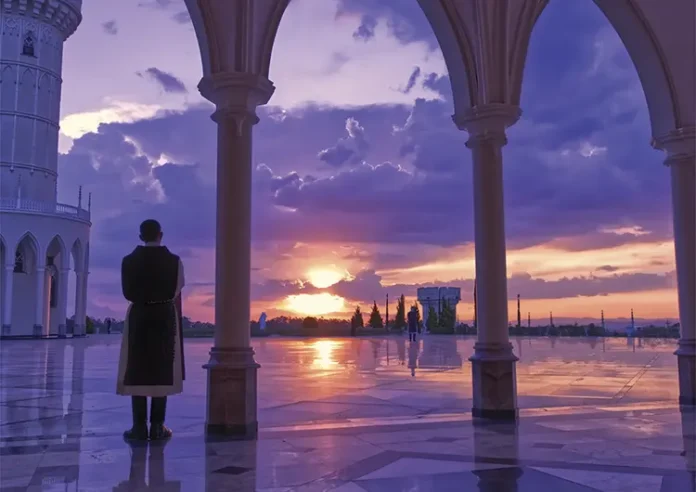It is inherent to the human spirit to seek the unum of things, that is, the intelligence strives to reach a point that defines and synthesizes what has been known in separate details and analysed in its minutiae. These pages, without a doubt, are no exception to the rule.1
Has everything been said about Dr. Plinio, his spirit and his vocation? Those who knew him personally can assert the opposite with all certainty
As we arrive at their end, it is inevitable that we feel the need to draw a conclusion. Accordingly, questions like these arise in our minds: “Has everything been said about Dr. Plinio? Has his personality been fully outlined? Have his vocation and his role in history been thoroughly comprehended?”
Perhaps a poorly informed reader would be inclined to answer in the affirmative However, those who knew Dr. Plinio closely think differently…
A tower whose peak is lost in the firmament
Although this edition gives an overview of who he was, after examining many facets of his souls one comes to the conclusion that it is very difficult to arrive at an all-encompassing notion of the vocation and the spirit of a man who, at sixty years of age, was capable of affirming that the totality of his memories would provide material to fill more than a hundred volumes!2
Neither the remarkable gift of prophecy nor the discernment of spirits, by which he was able to see souls, penetrate circumstances from a distance, and describe a country he had never visited; nor again his vibrant personality, splendidly courageous and representative of God’s greatness; or even his paternal kindness, which drew numerous sons to him: none of these fully portray him.
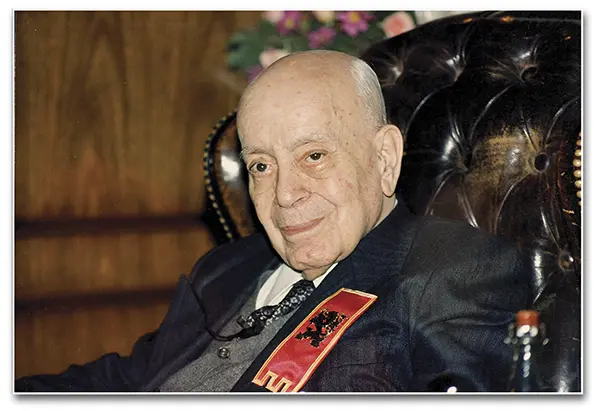
He himself, on various occasions, attested to having experienced in relation to himself, in fleeting moments, the curious sensation of a person who looks out of the window of a tower without being able to glimpse the top of it.
In fact, Providence chose to raise him up as a tower of wisdom: those who entered this tower acquired knowledge that is neither taught in universities, nor found in books. And those who lived with him had the feeling of being closer to God – such was the unquenchable flame of enthusiasm that burned in his soul, a column of fire so high that its peak was lost in the firmament.
A mission to accomplish
However, it is not merely the amplitude and richness of his personal gifts that make it so daunting a task to convey a complete picture of Dr. Plinio. There is another, much deeper reason, based on the fact that his providential mission has not yet been entirely fulfilled on earth. Far from viewing him as a figure from the past whose journey reached its consummation on October 3, 1995, it is necessary to consider him in intimate relation with the unfolding of current events.
Persecution, slander, oblivion, even death and the granite of a tomb are not able to prevent his light from shining through
How many people pass through life like leaves on a tree, which, once dried up, are blown away by the wind, leaving no lasting memory behind!
But there is a principle pertaining to spiritual values that permeates the whole of history: whenever a person endowed with unparalleled gifts of the Holy Spirit and singled out by a special calling seems to have been extinguished by ostracism, a time comes when the obstacles raised by his enemies to hide the splendour and greatness of his person can no longer be sustained.
Neither the persecutions, nor the campaigns of slander or silence of adversaries, nor the inattentiveness of some of his closest companions, nor even death itself and the granite slab of the tombstone can prevent his light from breaking forth, scattering the darkness…
His light will shine before all mankind!
These thoughts accompanied me throughout the days leading up to Dr. Plinio’s death, and above all during the funeral, as I sensed the dereliction in which Dr. Plinio passed from this world, forgotten and rejected by so many, to the point of not a single ecclesiastical, civil or military authority appearing to pay him their final respects. Only his sons were there to lay him to rest.
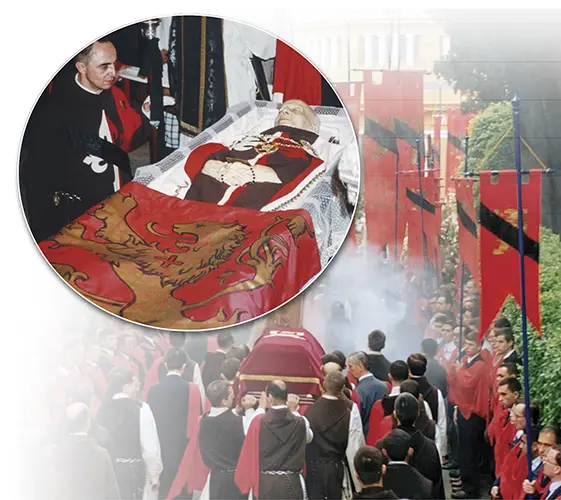
Faced with this reality, I was led to conclude: “This is a mystery. It is not possible for a man of Dr. Plinio’s moral stature to die in isolation and become lost in the mists of time like so many others. If men turn their backs on him, the Angels and saints will descend from Heaven to earth to pay him funeral honours! Months may go by, perhaps years, but dawn will finally break, and by an influx of divine grace, his light will reappear from amidst the haze, and, like a dazzling midday sun, it will shine for all of mankind!”
During the Holy Masses and other rites surrounding Dr. Plinio’s interment, the prevailing atmosphere of faith confirmed my filial conviction. Far from reactions of dejection, gloom or unbelief, the first effect of his departure from this world was a surge of new and intense graces amidst his true followers, filling them with joy despite the apparent tragedy.
Never had his spiritual sons demonstrated such clear certainty in the victory of his mission as during those stirring ceremonies. They participated with serene expressions, heads held high, and a firm and confident bearing.
God and His chosen ones do not die
From that day on, I began to experience something similar to what ensued after the death of Dona Lucilia: it was difficult to remember that Dr. Plinio had died. I felt him alive, and constantly within my reach; not as before, when I guided his wheelchair, but rather as if he were going before me, opening the way, and yet somehow turned to face me so that it was always possible to maintain eye contact.
Such was his union of soul with Dr. Plinio that, when the latter was in eternity, his presence increased in the depths of Msgr. João’s heart
Moreover, I noted an ever intensifying effect of Dr. Plinio’s spirit within me, in a way that is difficult to express in words. Such had been my spiritual union with Dr. Plinio that now, with him in eternity, through a true mystical phenomenon, his presence in the very depths of my heart was all the more vivid.
On the other hand, as time went by, this supernatural inspiration was also felt by his other followers, united in their enthusiasm and fidelity to their father and teacher. His figure was alive in their memory, and from Heaven, he was a channel of sanctity for his disciples.
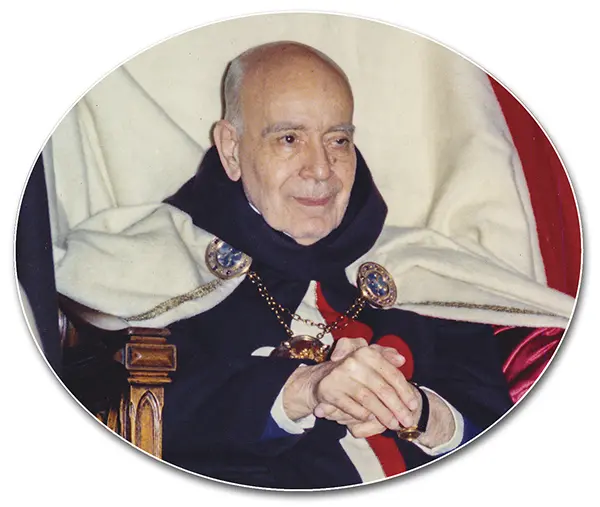
Applicable here is the phrase uttered by the Catholic president of Ecuador, Gabriel García Moreno, as he lay wounded and dying on the steps of the National Palace in Quito: “¡Dios no muere! – God does not die!”3
Now, if God does not die, neither does a man of God, precisely because he is a reflection of God! Death only represents an interval when considered from the earthly perspective of time; before the divine throne, God’s chosen ones are always alive.
Indeed, although he physically experienced the ordeal of death three decades ago, his spirit is alive and active, and with the aid of the Mediatrix of all graces, will remain immortal in his work for future centuries. He is alive in his writings, alive in the precious legacy of his oral and written expositions, alive in the course that he indicated, alive in the way of life that he instituted; above all, alive in the human type he inspired, namely, in those souls in which was planted a seed of prophetism, which is a participation in his own charism.
First glimmers of the Reign of Mary
Dr. Plinio spent his whole life yearning for the Reign of Mary – that reign foreseen by St. Louis-Marie Grignion de Montfort, and announced by Our Lady to the three shepherd children in Fatima; that reign already glimpsed by him in his early youth, the continual object of his contemplation and admiration; that reign in which the fruits of the Most Precious Blood of Our Lord Jesus Christ and the tears of Mary Most Holy will work their full effect on the face of the earth.
His spirit lives on and will remain immortal in the souls in which a seed of prophetism has been planted, a participation in his charism
Nevertheless, Providence chose to take him from this life before his bodily eyes could witness the effective realization of this promise… Undoubtedly, he will see it with the eyes of the soul from the vantage point of eternity, and his mission will be accomplished as he always hoped, by means of his spiritual sons.
At a certain moment, according to the law of history, there will be a glorious manifestation from God! The Revolution denounced by Dr. Plinio for so many years will be humiliated, condemned, and defeated, and the Church will flourish again with an utterly unprecedented beauty, light, and vigour.
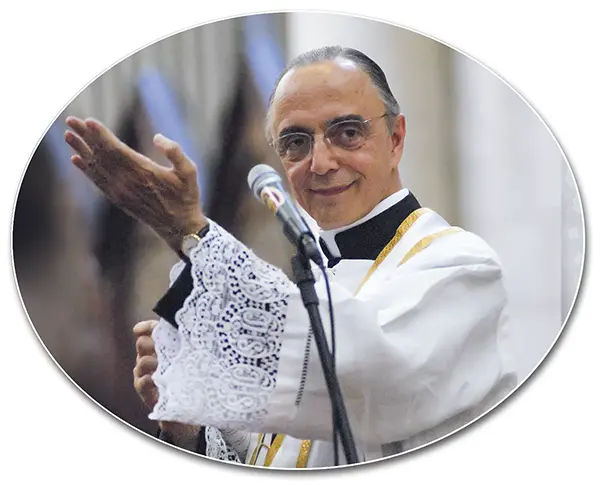
When will this come about? We do not know. But from atop the mountain of faith, the first glimmers of the magnificent dawn of the Reign of the Most Blessed Virgin over the earth can already be detected. May She, as I ardently desire, deign to make use of these pages to hasten the proclamation, in a concrete and definitive way, of the triumph of her Immaculate Heart! ◊
Notes
1 This article is a transcription of the concluding chapter of work in five volumes written by Msgr. João on Dr. Plinio (cf. O dom de sabedoria na vida, mente e obra de [The Gift of Wisdom in the Life, Mind, and Work of] Plinio Corrêa de Oliveira. Città del Vaticano-São Paulo: LEV; Lumen Sapientiæ, 2016, v.V, pp. 479-486). With minor adaptations to make it more accessible to the reader, the text is perfectly suited as the conclusion to this edition of our Magazine dedicated to this distinguished Catholic leader.
2 Cf. CLÁ DIAS, EP, João Scognamiglio. O dom de sabedoria na mente, vida a obra de [The Gift of Wisdom in the Life, Mind, and Work of] Plinio Corrêa de Oliveira. Città del Vaticano-São Paulo: LEV; Lumen Sapientiæ, 2016, v.I, p.29.
3 GALVEZ, Manuel. Vida de Don Gabriel García Moreno. Madrid: González, 1945, p.480.


